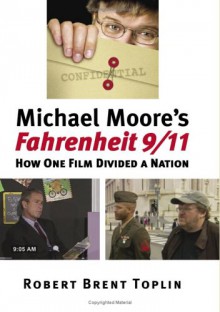Michael Moore's Fahrenheit 9/11: How One Film Divided a Nation
In the heat of the 2004 presidential election campaign, no single work of speechmaking, writing, or media production fueled the fiery debate over George W. Bush's leadership as much as Michael Moore's Fahrenheit 9/11. Certainly, no American documentary film ever provoked as much political...
show more
In the heat of the 2004 presidential election campaign, no single work of speechmaking, writing, or media production fueled the fiery debate over George W. Bush's leadership as much as Michael Moore's Fahrenheit 9/11. Certainly, no American documentary film ever provoked as much political controversy. A noted film scholar now offers a much-needed appraisal of both the film and the furor surrounding it. Robert Brent Toplin first examines the development of Moore's ideas and the evolution of his filmmaking, then dissects Fahrenheit 9/11 and explores the many claims and disagreements about the movie's truthfulness. Toplin considers the ways in which Moore based his arguments on a diverse array of "primary sources," many of which had received scant attention in the mainstream media-including the notorious seven-minute "Pet Goat" video depicting President Bush-either deliberately calm or paralyzed-in a Florida classroom on being told of the 9/11 attacks. Finally, Toplin considers the movie's impact, noting that some enthusiasts of the film thought it would help Democrats in the 2004 elections while others argued that Moore's strident approach to issues would turn off swing voters and contribute to a Republican victory. Critics lambasted Fahrenheit 9/11, claiming Moore violated standards of documentary filmmaking through his excessive partisanship. They also berated him for taking events out of context and getting the facts wrong. Toplin contends that partisanship is a well-established tradition in documentary filmmaking, and he shows that the major disagreements between admirers and detractors of Fahrenheit 9/11 revolved around interpretation rather than the factual record. Michael Moore took some controversial risks, Toplin demonstrates, but on many large and small matters-from his treatment of the Bush administration's reactions to 9/11 and war-making in Iraq to disputes about the Saudi flights from the United States after 9/11-Moore raised many legitimate questions. Toplin's engaging study shows that Michael Moore's film did more than shake up a nation; it also made an indelible contribution to the esteemed tradition of agenda-driven cinema. This book is part of the CultureAmerica series.
show less
Format: hardcover
ISBN:
9780700614523 (0700614524)
Publish date: April 1st 2006
Publisher: University Press of Kansas
Pages no: 161
Edition language: English

